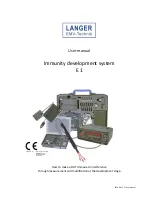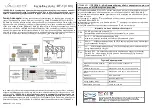
c) With the equipment switched off, connect one cell at a time to the junction box,
switch on the equipment, select Test 2 of the Diagnostic Procedure and check
that the value displayed, even if negative, is stable within an interval of 5/10
minutes. Furthermore, verify that by loading a weight on the mixing wagon near
the load cell, the displayed weight changes in proportion to the load applied.
This procedure is used to check the correct functioning of each load cell and the
junction box.
d) If after having completed the checks described in point c, the load cells are all
unstable; with the equipment turned off, disconnect the connection cables from
the equipment’s junction box and connect one load cell at a time directly to the
equipment.
Switch on the equipment, selecting Test 2 in the Diagnostic Procedure, and
verify that the displayed value is stable for a time interval of 5/10 minutes.
Furthermore, check that by loading a weight on the mixing wagon near the
loading cell, the displayed weight changes in proportion to the load applied. If
the load cells prove to be unstable, this probably means that the junction box is
broken.
17. Open the equipment case, consulting Chapter 1.4 of the User’s Guide, and
check that there are no traces humidity or infiltration of water and that all of the
components on the electronic cards are properly in place and show no signs of
burning or rusting.
If the problem should persist even after checking the device using the procedures as
described above, contact
Customer Service
.
IINDICATION OF (ERR- 1) ON THE DISPLAY
1. Carry out points 11 ÷ 17 of the previous procedure.
AppeNdiX d
8
Summary of Contents for FEED NAVIGATOR
Page 1: ...USER S GUIDE V 1 0 A ...
Page 2: ......
Page 11: ...Figure 5 chApter 1 ...
Page 12: ......
Page 70: ......
Page 82: ......
Page 89: ...notes 85 notes ...
Page 90: ...user s guide 86 notes ...






































